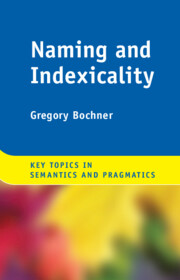25 results
Chapter 8 - E. M. Forster
- from Part II - 1900–1945
-
-
- Book:
- The British Novel of Ideas
- Published online:
- 05 December 2024
- Print publication:
- 12 December 2024, pp 150-165
-
- Chapter
- Export citation
Chapter 1 - Pragmatism
-
- Book:
- Pragmatism and Methodology
- Published online:
- 04 January 2024
- Print publication:
- 25 January 2024, pp 1-25
-
- Chapter
-
- You have access
- Open access
- HTML
- Export citation
8 - Pragmatics and Emotion
-
- Book:
- Pragmatics and Emotion
- Published online:
- 13 December 2023
- Print publication:
- 21 December 2023, pp 144-148
-
- Chapter
- Export citation
2 - Pragmatics and Emotion
-
- Book:
- Pragmatics and Emotion
- Published online:
- 13 December 2023
- Print publication:
- 21 December 2023, pp 13-28
-
- Chapter
- Export citation
Truth without truths: Grim's Cantorian paradox and the ontology of the objects of omniscience
-
- Journal:
- Religious Studies / Volume 60 / Issue 4 / December 2024
- Published online by Cambridge University Press:
- 12 July 2023, pp. 535-548
- Print publication:
- December 2024
-
- Article
-
- You have access
- HTML
- Export citation
Chapter 9 - Heidegger and the Authority of Logic
- from Part III - Paradox, the Prospects for Ontology, and Beyond
-
-
- Book:
- Heidegger on Logic
- Published online:
- 15 September 2022
- Print publication:
- 22 September 2022, pp 182-200
-
- Chapter
- Export citation
Conclusion
-
- Book:
- Naming and Indexicality
- Published online:
- 02 December 2021
- Print publication:
- 09 December 2021, pp 254-257
-
- Chapter
- Export citation

Naming and Indexicality
-
- Published online:
- 02 December 2021
- Print publication:
- 09 December 2021
True by Default
-
- Journal:
- Journal of the American Philosophical Association / Volume 8 / Issue 1 / Spring 2022
- Published online by Cambridge University Press:
- 27 August 2021, pp. 92-109
-
- Article
- Export citation
1 - Interactional Language
-
- Book:
- The Grammar of Interactional Language
- Published online:
- 28 May 2021
- Print publication:
- 17 June 2021, pp 1-8
-
- Chapter
- Export citation
Implicit Bias as Mental Imagery
-
- Journal:
- Journal of the American Philosophical Association / Volume 7 / Issue 3 / Fall 2021
- Published online by Cambridge University Press:
- 14 June 2021, pp. 329-347
-
- Article
-
- You have access
- Open access
- HTML
- Export citation
The problem of empty names and Russellian Plenitude
-
- Journal:
- Canadian Journal of Philosophy / Volume 46 / Issue 3 / June 2016
- Published online by Cambridge University Press:
- 01 January 2020, pp. 387-404
-
- Article
- Export citation
What are the primary bearers of truth?
-
- Journal:
- Canadian Journal of Philosophy / Volume 43 / Issue 5-6 / December 2013
- Published online by Cambridge University Press:
- 01 January 2020, pp. 558-574
-
- Article
- Export citation
Propositions and higher-order attitude attributions
-
- Journal:
- Canadian Journal of Philosophy / Volume 43 / Issue 5-6 / December 2013
- Published online by Cambridge University Press:
- 01 January 2020, pp. 741-765
-
- Article
- Export citation
Why we should not identify sentence structure with propositional structure
-
- Journal:
- Canadian Journal of Philosophy / Volume 43 / Issue 5-6 / December 2013
- Published online by Cambridge University Press:
- 01 January 2020, pp. 612-633
-
- Article
- Export citation
The metaphysics of propositional constituency
-
- Journal:
- Canadian Journal of Philosophy / Volume 43 / Issue 5-6 / December 2013
- Published online by Cambridge University Press:
- 01 January 2020, pp. 655-678
-
- Article
- Export citation
Expressivism, meaning, and all that
-
- Journal:
- Canadian Journal of Philosophy / Volume 48 / Issue 3-4 / 2018
- Published online by Cambridge University Press:
- 01 January 2020, pp. 337-356
-
- Article
- Export citation
Not the optimistic type
-
- Journal:
- Canadian Journal of Philosophy / Volume 43 / Issue 5-6 / December 2013
- Published online by Cambridge University Press:
- 01 January 2020, pp. 575-589
-
- Article
- Export citation
What are Propositions?
-
- Journal:
- Canadian Journal of Philosophy / Volume 43 / Issue 5-6 / December 2013
- Published online by Cambridge University Press:
- 01 January 2020, pp. 702-719
-
- Article
- Export citation
Unnecessary existents
-
- Journal:
- Canadian Journal of Philosophy / Volume 43 / Issue 5-6 / December 2013
- Published online by Cambridge University Press:
- 01 January 2020, pp. 766-775
-
- Article
- Export citation

